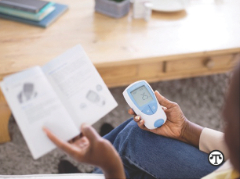 NAPSA — If you or someone you know is on blood thinners and tired of traveling to a clinic for a clotting time test, you may be relieved to learn about a much more convenient option: testing yourself at home, on your fingertip.
NAPSA — If you or someone you know is on blood thinners and tired of traveling to a clinic for a clotting time test, you may be relieved to learn about a much more convenient option: testing yourself at home, on your fingertip.
Many people with atrial fibrillation (an irregular heartbeat, known as “AFib”) or other conditions that can lead to blood clots have to be on lifelong treatment with anticoagulant medications such as Coumadin (warfarin) to help “thin” their blood. Since diet, stress and other factors make patients react differently to warfarin, they need to have their clotting time tested regularly. That can involve a lot of time and hassle to travel to a lab, clinic or doctor’s office.
The easy alternative – testing less often than your doctor recommends – is not a good or safe option. Checking your clotting time at regular intervals allows your doctor to make sure you are on the right dose of warfarin: Too low and it might not effectively prevent clots; too high and your blood could get too thin. Both can lead to serious complications, such as a stroke or uncontrolled bleeding.
So it’s essential to have a regularly scheduled test that measures the time it takes for your blood to clot (Prothrombin Time, often reported as an International Normalized Ratio; hence the moniker “PT/INR test”).
The real question is: where?
Convenience at your fingertips
The traditional way to get a PT/INR test is to have your blood drawn at a clinic or doctor’s office and sent to a lab, which may take several days. Now, however, there’s Patient Self-Testing (PST). You can test at home, at work or wherever you happen to be, right on your fingertip. You simply prick your finger, place a drop of blood on a test strip and wait about a minute for a small handheld meter to give you the result.
Your health care team will still be closely involved with your care and anticoagulation treatment. You call in your results or enter them online right after you test, and you make office visits as directed by your doctor to monitor your testing and make therapy adjustments.
But PST offers so much more flexibility and convenience that it can make a world of difference in how you feel about testing. In one study, 77 percent of the warfarin patients preferred the convenience of self-testing over testing at a clinic.
Studies also show that patients who self-test tend to test more often, so they stay in the proper therapeutic range longer than patients who are monitored less often by a doctor. The longer you stay in range, the lower your chances of having an adverse event, like a stroke or even death.
Is PST right for me?
If you’re considering PST for yourself or someone you care for, talk with your doctor to make sure it’s a good fit for you and your lifestyle. You should be motivated to test, physically able to perform the test (after training), and responsible to follow your doctor’s orders for how often to test and how to report your results.
The next step will be for your doctor to write a prescription and connect you with a PST service provider that can supply the meter and the necessary face-to-face training from a certified professional. The provider can also help you with ordering supplies, reporting results and filing insurance paperwork, and can even send you gentle reminders to help you stay on your testing schedule and keep your therapy on track.
The costs associated with self-testing may be reimbursable through Medicare or a private insurer, depending on your diagnosis and medical coverage.
Research shows that nearly two out of three AFib patients who are not testing at home don’t even know it’s an option. So friends and family can be a big help by sharing this information. To request a PST patient information kit or to learn more about potential coverage for PST through Medicare or private insurance, call (888) 601-0229 or visit www.TestWithCoaguChek.com.
You can save time and trouble testing your blood at home.



